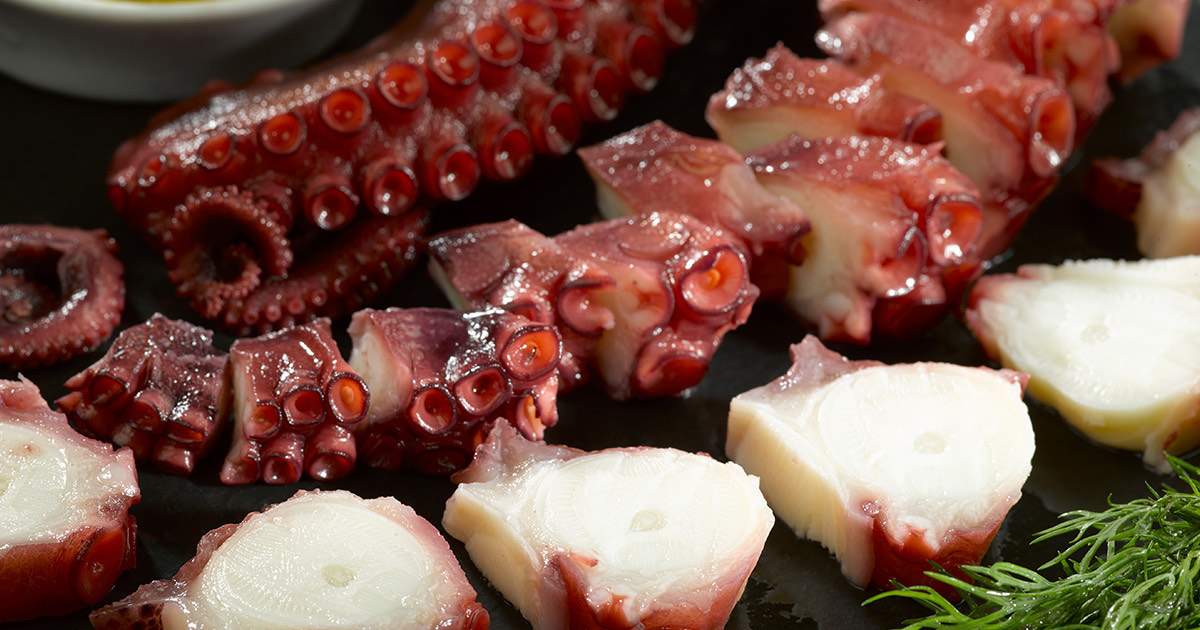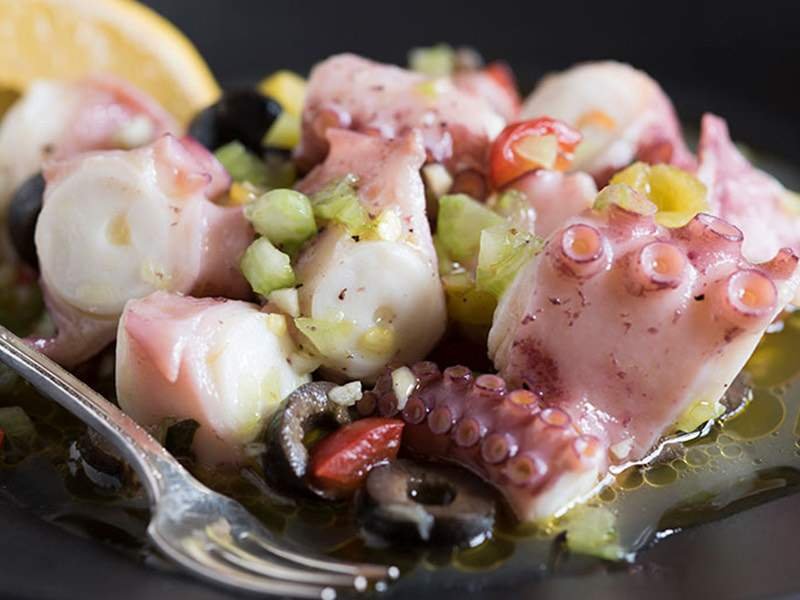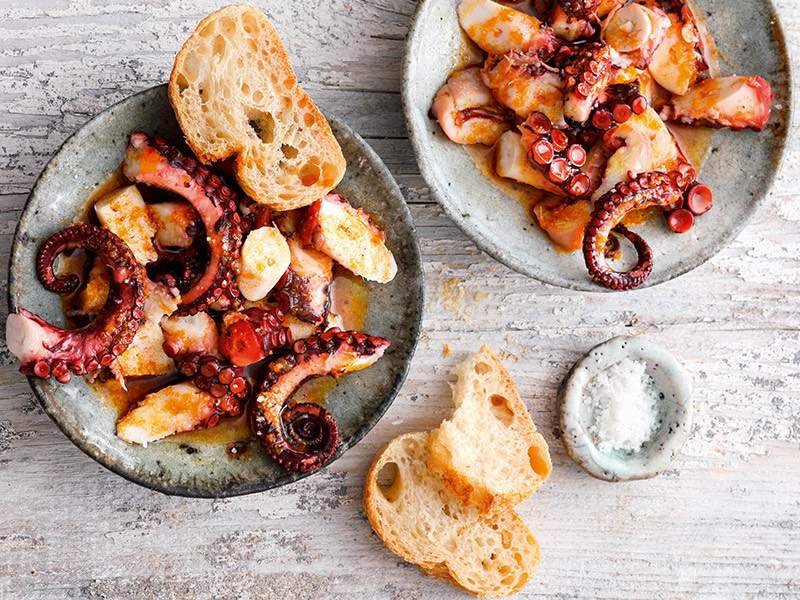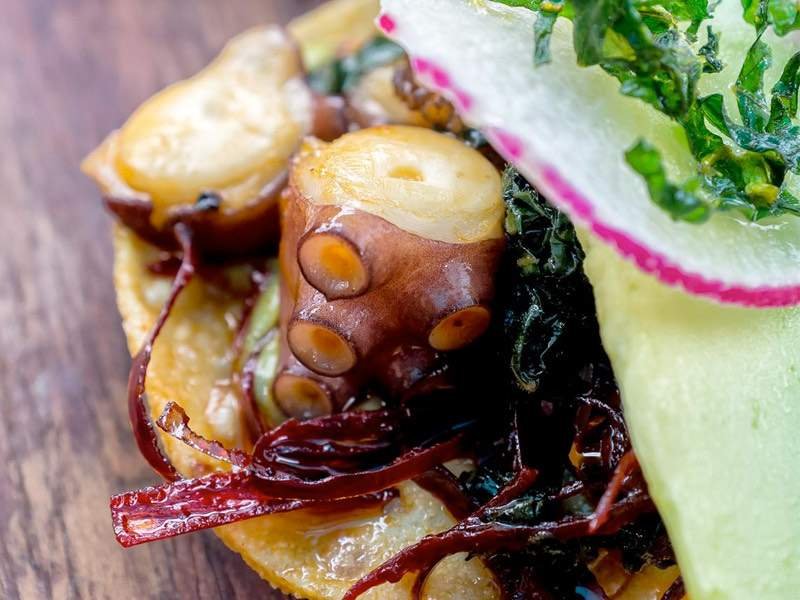Your Essential Guide to Octopus

Octopus may be intimidating to some, but Robert DiGregorgio, FultonFishMarket.com’s Head of Quality Control, says there's nothing to fear - octopus is easy and delicious to prepare.
Octopus vulgaris is the most common species of octopus, and popular from the Mediterranean all the way to America. There are around 300 species of octopus all over the world and, while they are technically mollusks like clams and oysters, they are obviously very different. For example, no shells! Like squid and cuttlefish, they are cephalopods, meaning their “arms” are seemingly attached directly to their heads. Octopuses have three hearts, eight arms and nine brains. A mouth like a parrot’s beak. No skeletal structure. And the amazing ability to change not only their size, color and patterns, but their texture as well to blend in, almost invisibly, with their surroundings. Predators often swim right past them completely unaware the octopus is inches away. If it is discovered, it can eject a large cloud of ink, like a smoke screen, to obscure the attacker's vision and swim away. And they are very fast swimmers, expelling water through their siphon, kind of “jet propelling” themselves through the water, and being boneless, can squish themselves into the smallest crevice. If all else fails and it is actually grabbed by a predator, it can lose an arm or two if it has to, and regenerate them later with no permanent damage.
Amazing animals. And very intelligent as well. Octopus have been studied extensively, and they have successfully navigated mazes, unscrewed jars to get at food inside, found hidden food, and built walls around its dens using shells and rocks.
In the U.S. it used to be that octopus was found mainly in Mediterranean restaurants, but these days, buoyed by the increased popularity of sushi, tapas and an expanding interest in alternative proteins, octopus is now on many menus, and grilling octopus at home is becoming almost as common as grilling steaks (okay, maybe not, but we’re getting there!).
Octopus catches have almost doubled from 179 metric tons in 1980 to 355 metric tons in 2014 and now, according to the FAO (Food and Agriculture Organization), the global catch has increased to 420 metric tons. Its popularity in America has soared recently and it is common to find it on many menus beyond Mediterranean cooking. So much so that there is now international concern about octopus being overfished. In that vein, there is increasing worldwide interest in octopus aquaculture, and scientists in Mexico, Spain and Japan are working on coming up with eco-friendly, sustainable octopus farms.
Octopus may seem daunting to the uninitiated, but they are not that difficult to prepare. Octopus freeze very well, some hold that freezing actually increases the quality by tenderizing it, and so they are mostly offered cleaned and frozen.
What Does Octopus Taste Like?
We’ve taste tested many kinds of octopus and the Portuguese octopus we believe is one of the best. The meat is very white with a nice, firm texture. If prepared correctly, it is not tough or chewy, but actually quite tender. To me, they taste kind of “scallopy” and “crabby” at the same time, and can be served in cold dishes as well as hot preparations.
Indian baby octopus, Amphioctopus membranaceus, are small and very tender. They are cleaned and frozen, head on, and are usually cooked that way as well. They are very versatile, used in salads with garlic, oil and parsley, marinated and grilled, sautéed, cooked in stews, and many other delicious preparations.
What Are the Health Benefits of Octopus?
Octopus are not only great to eat but they have some real health benefits to boot. They are a good source of manganese, which aids in the metabolism of cholesterol and carbohydrates, vitamin B12, riboflavin, calcium, iron, potassium, and they are an essential source of amino acids which help build protein and reduce the risk of cancer. Maybe best of all, they are low in fat, low in calories, and are a lean source of protein, ideal if you're following a Whole 30, Paleo or Keto diet.
At one time, I may have been the only one you knew who ate mussels, squid and octopus. But these days, these humble mollusks have found their way into America’s culinary lexicon.
Our Favorite Octopus Recipes
Salad doesn't have to be boring! Try this amazing Octopus Salad recipe that's easy and scrumptious.
Our Spanish octopus recipe, or pulpo a la gallega, will whisk you away to Spain’s sunny shores, where locals have enjoyed this classic dish for generations. Follow our cooking tips to guarantee tender octopus every time. Don’t forget the crusty white bread to mop up the delicious sauce.
Taco Tuesdays just got a serious upgrade with our delicious grilled octopus tacos recipe. Our tender, cooked octopus tentacles makes assembling these a breeze. We quickly grill the octopus tentacles to pick up a little smokey sear, then stuff them into tortillas with crispy radish and creamy avocado.



